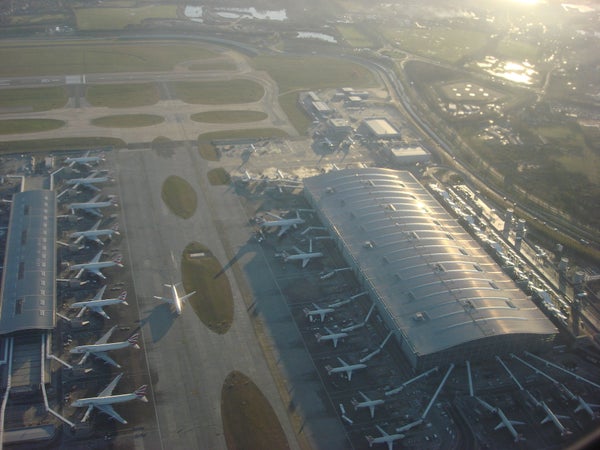This article was published in Scientific American’s former blog network and reflects the views of the author, not necessarily those of Scientific American
Expanding Heathrow is the best answer to the airport capacity problem in the United Kingdom, according to a report by the U.K.'s Airports Commission, published Wednesday. Its conclusion was “clear and unanimous” amongst commission members, said Sir Howard Davies, and was the product of an “extensive work programme.”
But, not all are ready to support the Heathrow expansion. According to Boris Johnson, the Mayor of London:
“It’s perfectly obvious to everybody, I think, that the restrictions that Sir Howard is trying to impose really give the game away. That this [third runway at Heathrow] would lead to a huge increase in noise pollution. That is would lead to an increase in particulate pollution. And it would intensify the status of Heathrow as the number one noise-polluting airport in Europe – by miles.
One of the problems about this report is that it only really deals with a fifteen-year time horizon. It says, get a third runway in the ground by 2030 and then it leaves open what will happen next. Heathrow will come forward with plans for a fourth runway and the pressure will simply grow.”
On supporting science journalism
If you're enjoying this article, consider supporting our award-winning journalism by subscribing. By purchasing a subscription you are helping to ensure the future of impactful stories about the discoveries and ideas shaping our world today.
The restrictions that the Mayor refers to are the Airport Commission’s recommendations that the Heathrow expansion occur with a set of “accompanying measures” to address noise and pollution concerns. In the final report, released Wednesday, Sir Howard stated that:
“Heathrow expansion has of course been recommended before, and subsequently set aside in the face of local opposition. To make expansion possible the Commission recommends a comprehensive package of accompanying measures which would make the airport’s expansion more acceptable to its local community and to Londoners generally… includ[ing] a ban on night flights, more reliable respite for overflown communities, a legally-enforced “noise envelope”, a statutory independent aviation noise authority, and a noise levy to fund afar stronger and more generous set of compensation and mitigation schemes. New measures to ensure acceptable air quality around the airport will also be needed.”
Sir Howard went on to say that Heathrow should not be allowed to expand beyond a third runway at any point “as there is no environmental or operational case for a fourth runway.” He also specifically stated that a fourth runway at Heathrow, “should be ruled out by government through legislation firmly and finally.”
According to the Commission’s report, an expanded Heathrow Airport “would not inflict noise nuisance on more people than the airport does today, and the people affected would be far better compensated.” This compensation would take the form of financial resources for pollution mitigation related to both noise and air pollution.
The area surrounding Heathrow airport currently experiences levels of air pollution from nitrogen dioxide (NO2) that exceed limits set by the European Union. Without mitigation, the Airports Commission found that “around 39-47,000 homes around Heathrow would experience worsening of NO2 levels” with the addition of a third runway at Heathrow.
However, even when considering noise and air pollution, the Commission found that the Heathrow expansion was the best of the options presented - including the proposal for a second runway at the more rural Gatwick Airport, located south of London's city centre - according to their analysis criteria.
Today, researchers estimate that 110 premature deaths occur each year across the U.K. due to air pollution from U.K. airports. According to research out of MIT and Cambridge, air quality concerns related to a Heathrow expansion are valid - though perhaps avoidable if near-term mitigation strategies can be deployed, as maintained by the Airports Commission.
It has been over 60 years since the last full-length runway was constructed in the London region. Given increasing demand for flights, the entire London airport system would be full by 2040 according to the Airports Commission. Therefore, a new runway must be constructed by 2030 to promote the “trade and inward investment” that is “crucial for a global city like London.”
